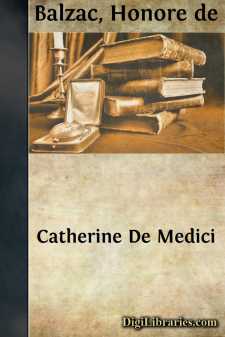Literary Collections
- American 84
- Ancient, Classical & Medieval 14
- Asian 1
- Australian & Oceanian 1
- Canadian 55
- Continental European 121
- English, Irish, Scottish, Welsh 179
- Essays 160
- General 24
- Letters 46
- Middle Eastern 1
Literary Collections Books
Sort by:
INTRODUCTION The story of Love, that simple theme with variations ad libitum, ad infinitum, is never old, never stale, never out-of-date. And as we sometimes seek rest from the brilliant audacities and complex passions of Wagner or Tschaikowsky in the tender simplicity of some ancient English air, so we occasionally turn with relief from the wit and insight and subtlety of our modern novelists to the...
more...
by:
Honore de Balzac
INTRODUCTION There is a general cry of paradox when scholars, struck by some historical error, attempt to correct it; but, for whoever studies modern history to its depths, it is plain that historians are privileged liars, who lend their pen to popular beliefs precisely as the newspapers of the day, or most of them, express the opinions of their readers. Historical independence has shown itself much...
more...
I. HISTORY. THERE is one mind common to all individual men. Every man is an inlet to the same and to all of the same. He that is once admitted to the right of reason is made a freeman of the whole estate. What Plato has thought, he may think; what a saint has felt, he may feel; what at any time has befallen any man, he can understand. Who hath access to this universal mind is a party to all that is or...
more...
by:
Honore de Balzac
A DRAMA ON THE SEASHORE Nearly all young men have a compass with which they delight in measuring the future. When their will is equal to the breadth of the angle at which they open it the world is theirs. But this phenomenon of the inner life takes place only at a certain age. That age, which for all men lies between twenty-two and twenty-eight, is the period of great thoughts, of fresh conceptions,...
more...
by:
Various
The First Comfort of Matrimony.Happy were Man, when born as free as Air,Did he that freedom as he ought, prefer;But the first Thing he sets his Heart upon,Is to be Married, and to be undone:On some youngGirlhe casts his wanton Eyes,And wooes her with fine Complements and Toys.But that's not all—he grows in Love at last,And is impatient till those Joys he taste:Nor do's the wishing Virgin...
more...
I Once upon a time there lived upon an island a merry and innocent people, mostly shepherds and tillers of the earth. They were republicans, like all primitive and simple souls; they talked over their affairs under a tree, and the nearest approach they had to a personal ruler was a sort of priest or white witch who said their prayers for them. They worshipped the sun, not idolatrously, but as the...
more...
Chapter 1 Many years ago, how many need not be recorded, there lived in his ancestral castle, in the far north of Scotland, the last Earl of Cairnforth. You will not find his name in "Lodge's Peerage," for, as I say, he was the last earl, and with him the title became extinct. It had been borne for centuries by many noble and gallant men, who had lived worthily or died bravely. But I think...
more...
by:
Jenny Wren
CHAPTER I. ON LOVE."Love is of man's life a thing apart;'Tis woman's whole existence."So sings the poet, and so agrees the world. Humiliating as it is to make the confession, it is undeniably true. "Men and Dress are all women think about," cry the lords of creation in their unbounded vanity. And again, we must submit—and agree—to the truth of the accusation; at any...
more...
PREFACE. HOME! How at the word, a crowd of pleasant thoughts awaken. What sun-bright images are pictured to the imagination. Yet, there is no home without its shadows as well as sunshine. Love makes the home-lights and selfishness the shadows. Ah! how dark the shadow at times—how faint and fleeting the sunshine. How often selfishness towers up to a giant height, barring out from our dwellings every...
more...
by:
Andrew Lang
CHAPTER I AN ISLAND LANDFALL For nearly ten years my health had been declining; and for some while before I set forth upon my voyage, I believed I was come to the afterpiece of life, and had only the nurse and undertaker to expect. It was suggested that I should try the South Seas; and I was not unwilling to visit like a ghost, and be carried like a bale, among scenes that had attracted me in youth and...
more...











